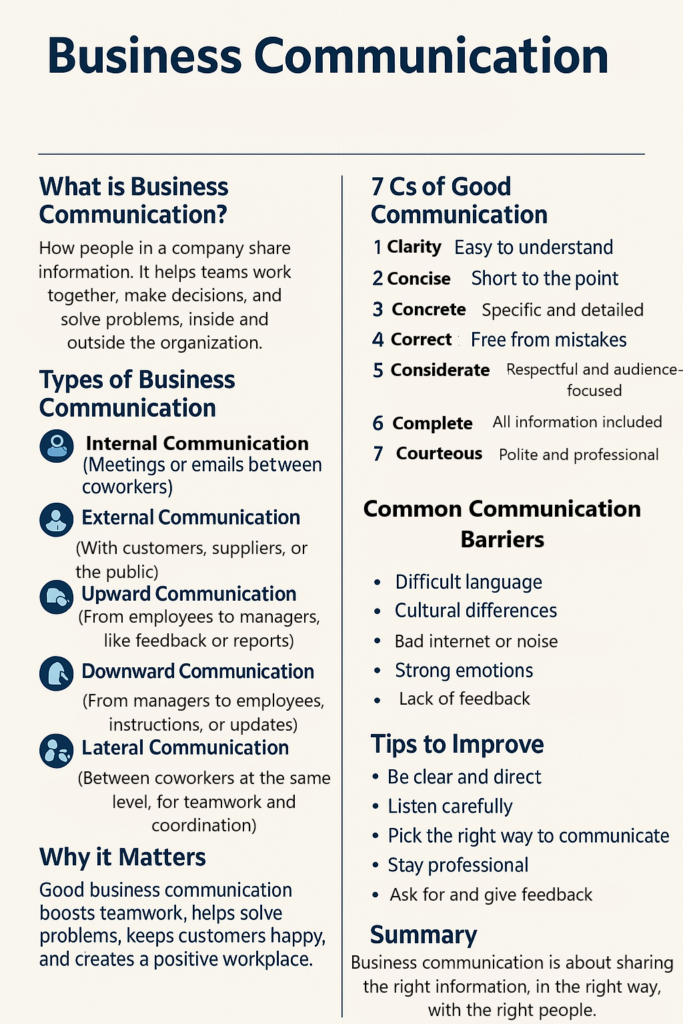Leadership Skills for Entrepreneurs and Small Business Owners
Entrepreneurs and small business owners play a central role in the success of their businesses. They not only oversee day-to-day operations but also set the tone for the company’s culture and direction. Leadership skills are essential for managing employees, making key decisions, and driving the business forward. Here’s a breakdown of the most important leadership skills that entrepreneurs and small business owners need.

1. Vision and Strategic Thinking
A great leader has a clear vision for the future of their business. This involves setting long-term goals, understanding where the business is heading, and making decisions that support that vision. Strategic thinking means looking at the big picture and planning ahead. Entrepreneurs need to anticipate changes in the market, competition, and customer needs. They also need to make sure their business can adapt and stay competitive.
- How to Develop It: Think long-term about where you want your business to be in 5 or 10 years. Make sure that every decision aligns with that vision.
2. Communication Skills
Strong communication is crucial for a business leader. Entrepreneurs need to clearly express their ideas, goals, and expectations to employees, customers, and stakeholders. Good communication helps avoid misunderstandings and builds trust within the team. It also allows a leader to motivate and inspire their team, ensuring that everyone is working towards the same goals.
- How to Develop It: Practice listening as much as talking. Always be clear, direct, and transparent in your communication with others.
3. Decision-Making Ability
Entrepreneurs and small business owners are constantly making decisions that affect the future of their business. Good leaders make informed and timely decisions. They gather information, analyze it, and make choices that move the business forward. While not all decisions will be perfect, a leader must be able to take risks and learn from mistakes.
- How to Develop It: Develop a systematic approach to decision-making. Weigh the pros and cons, but also trust your instincts and experience.
4. Emotional Intelligence (EQ)
Emotional intelligence refers to the ability to recognize, understand, and manage your own emotions, as well as the emotions of others. Entrepreneurs with high emotional intelligence can manage stress, communicate more effectively, and build stronger relationships with their teams. They understand how to motivate their employees, handle conflicts, and create a positive work environment.
- How to Develop It: Practice empathy, work on controlling your reactions, and try to understand the feelings and perspectives of others.
5. Problem-Solving and Adaptability
Running a business comes with its challenges. Entrepreneurs need to be great problem-solvers who can think critically and creatively when problems arise. In addition to problem-solving, adaptability is crucial. The business world is constantly changing, and a successful leader must be able to pivot when necessary, adjust strategies, and embrace new opportunities.
- How to Develop It: Cultivate a mindset of flexibility and creativity. Learn to look at problems from different angles and try to view challenges as opportunities to learn.
6. Delegation
One of the most important leadership skills for an entrepreneur is the ability to delegate tasks. Many business owners try to do everything themselves, but effective leaders know when to trust their team and pass on responsibilities. Delegation not only helps the business run more efficiently but also empowers employees, making them feel valued and engaged.
- How to Develop It: Recognize that you don’t have to do everything. Identify your strengths and delegate tasks that others can handle more effectively.
7. Time Management
Time is a precious resource for any business owner. Entrepreneurs need to manage their time effectively to ensure they’re focusing on the right tasks. This involves setting priorities, avoiding distractions, and using tools and systems to stay organized.
- How to Develop It: Use planners or digital tools to track your tasks and deadlines. Set aside time for both work and rest to avoid burnout.
8. Inspiring and Motivating Others
A good leader inspires their team to do their best work. Entrepreneurs need to be motivators, showing passion, enthusiasm, and confidence in their business. When the team sees that their leader is committed and excited, they are more likely to feel motivated and give their best effort.
- How to Develop It: Be a role model for the behavior you want to see in others. Recognize and celebrate achievements, and show appreciation for your team’s efforts.
9. Conflict Resolution
In any business, conflicts are bound to arise, whether between employees or with customers. A good leader must be able to handle conflicts calmly and professionally. This involves listening to all parties, finding common ground, and resolving disputes in a way that maintains positive relationships.
- How to Develop It: Practice active listening and remain neutral during conflicts. Focus on finding solutions that benefit everyone involved.
10. Resilience and Perseverance
Running a business is filled with ups and downs. The best leaders don’t give up when things get tough. Resilience and perseverance are essential qualities for entrepreneurs. These skills help them stay focused on their goals, learn from failures, and keep moving forward despite setbacks.
- How to Develop It: When faced with challenges, remind yourself why you started the business. Use setbacks as learning opportunities and keep pushing toward your goals.
Summary
In summary, leadership skills are essential for entrepreneurs and small business owners to succeed. These skills include having a clear vision, strong communication, decision-making ability, emotional intelligence, problem-solving skills, and adaptability. Successful leaders know how to delegate, manage time effectively, motivate others, and resolve conflicts. They also need to be resilient and able to handle setbacks with perseverance. By developing these leadership qualities, entrepreneurs can create a positive work environment, build strong teams, and drive their businesses toward growth and success.







